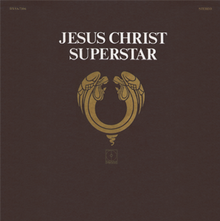Jesus Christ Superstar (album)
| Jesus Christ Superstar | ||||
|---|---|---|---|---|

Original UK cover
|
||||
| Studio album by Various artists | ||||
| Released | September 1970 | |||
| Recorded | 10 October 1969 ("Superstar" single) 1970 in Olympic Studios, London |
|||
| Genre | Art rock | |||
| Length | 86:56 | |||
| Label | Decca/MCA/Decca Broadway | |||
| Producer | Tim Rice, Andrew Lloyd Webber | |||
| Andrew Lloyd Webber and Tim Rice chronology | ||||
|
||||
| Singles from Jesus Christ Superstar | ||||
|
||||
| Alternative cover | ||||

US Edition Cover, May 1971
|
||||
| Professional ratings | |
|---|---|
| Review scores | |
| Source | Rating |
| Allmusic | |
Jesus Christ Superstar is a 1970 rock opera by Andrew Lloyd Webber and Tim Rice. The album musical is a musical dramatisation of the last week of the life of Jesus Christ, beginning with his entry into Jerusalem and ending with the Crucifixion. It was originally banned by the BBC on grounds of being "sacrilegious."
The album's story is based in large part on the Synoptic Gospels and Fulton J. Sheen's Life of Christ, which compares and calibrates all four Gospels. However, greater emphasis is placed on the interpersonal relationships of the major characters, in particular, Jesus, Judas and Mary Magdalene, relationships that are not described in depth in the Gospels.
"Herod's Song (Try It and See)" is a lyrical rewrite of "Try It and See," previously written by Lloyd Webber and Rice as a proposed UK entry into the 1969 Eurovision Song Contest to be sung by Lulu, then recorded and released as a single by Rita Pavone. The writers had also included it (as "Those Saladin Days") in an aborted show called Come Back Richard Your Country Needs You.
The melody of "I Don't Know How to Love Him" also predates Superstar; it was rewritten from a 1968 Lloyd Webber/Rice collaboration titled "Kansas Morning."
For the recording, Lloyd Webber and Rice drew personnel from both musical theatre (Murray Head had just left the West End production of Hair) and the British rock scene (Ian Gillan had only recently become the singer of Deep Purple). Many of the primary musicians — guitarists Neil Hubbard and Henry McCullough, bassist Alan Spenner, and drummer Bruce Rowland — came from Joe Cocker's backing group The Grease Band. Saxophonist Chris Mercer had also played with Hubbard in Juicy Lucy.
...
Wikipedia
